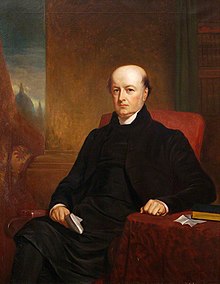Charles Blomfield
|
The Right Reverend and Right Honourable Charles James Blomfield |
|
|---|---|
| Bishop of London | |
 |
|
| Church | Church of England |
| Diocese | Diocese of London |
| Elected | 1828 |
| Term ended | 1856 (ill health) |
| Predecessor | William Howley |
| Successor | Archibald Campbell Tait |
| Other posts |
Bishop of Chester 1824–1828 |
| Orders | |
| Ordination | 1810 |
| Consecration | c. 1824 |
| Personal details | |
| Born |
29 May 1786 Bury St Edmunds, Suffolk, Great Britain |
| Died | 5 August 1857 (aged 71) |
| Buried | All Saints Church, Fulham |
| Nationality | British |
| Denomination | Anglican |
| Residence | Fulham Palace, London |
| Children | 6 daughters & 11 sons including: Arthur & Alfred |
| Alma mater | Trinity College, Cambridge |
Charles James Blomfield (29 May 1786 – 5 August 1857) was a British divine and classicist, and a Church of England bishop for 32 years.
Blomfield was born in Bury St Edmunds, Suffolk and educated at the local grammar school and at Trinity College, Cambridge, where he won the Browne medals for Latin and Greek odes, and the Craven scholarship. In 1808, he graduated as third wrangler and first medallist, and in the following year was elected to a fellowship at Trinity College. At Cambridge, Blomfield was tutored by John Hudson, mathematician and clergyman.
The first-fruits of his scholarship was an edition of the Prometheus of Aeschylus in 1810; this was followed by editions of the Septem contra Thebas, Persae, Choephori, and Agamemnon, of Callimachus, and of the fragments of Sappho, Sophron and Alcaeus.
Blomfield, however, soon ceased to devote himself entirely to scholarship. He had been ordained in 1810, and held in quick succession the livings of Chesterford, Quarrington, Lincolnshire, Dunton, Buckinghamshire, Great and Little Chesterford, and Tuddenham. In 1817 he was appointed private chaplain to William Howley, Bishop of London. In 1819 he was nominated to the rich living of St Botolph, Bishopsgate, and in 1822 he became archdeacon of Colchester. Two years later he was raised to the bishopric as bishop of Chester where he carried through many much-needed reforms.
...
Wikipedia
